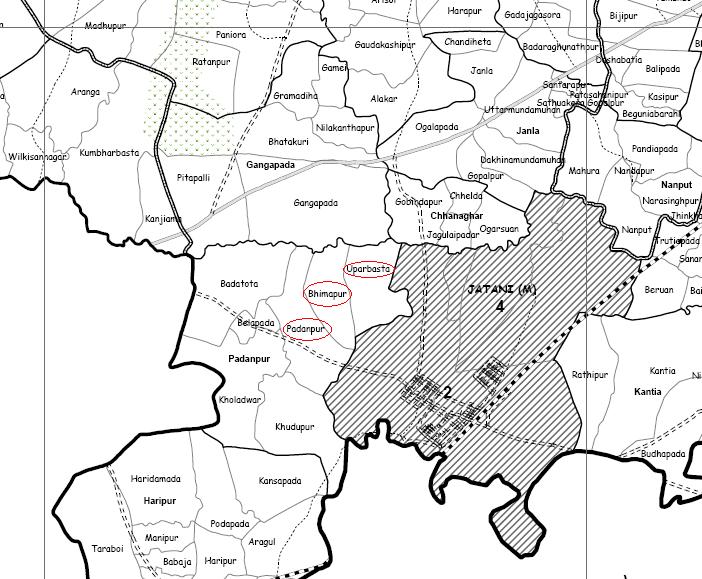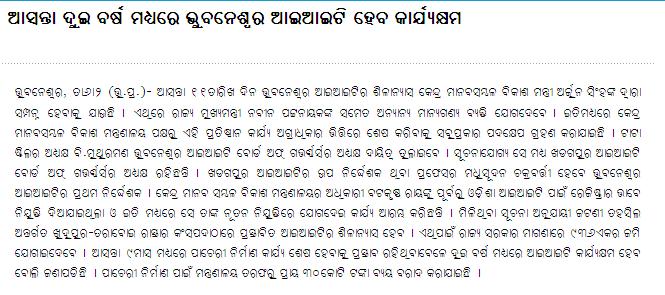Following is from a report by PIB.
The Government has decided to set up 20 counter-insurgency and Anti-Terrorism Schools during the XIth Plan. It is proposed to locate 4 schools each in the states of Assam, Bihar, Chhattisgarh, Jharkhand and Orissa with a view to providing training to the State police personnel to tackle the insurgency/naxal menace.
February 17th, 2009
(Update: The act is here.)
Following is an excerpt from a report in the Statesman.
The 50 year-old elite technical institute of the state was named Veer Surendra Sai University of Technology (VSSUT) on the eve of the golden jubilee valedictory celebrations today.
It may be mentioned here that the change was effected through a gazette notification on 12 February.
Students, staff and general mass at large have been demanding unitary university status to this oldest technical institution of the state and that got materialised today in the presence of the chief minister Mr Naveen Patnaik, Sambalpur MP Mr Prasanna Acharya, state industries minister Mr BB Harichandan, commerce and transport minister Mr Jayanarayan Mishra, secretary of the Alumni Association Mr Ashes Padhy, convener Prof. SK Sar and principal, Prof CR Tripathy.
… Dedicating VSSUT to the nation and unveiling the logo, the chief minister Mr Patnaik lauded in high words the commendable work of VSSUT, in spreading quality technical education in the country and producing technocrats of name and fame.
“The state is to witness a perceptible change soon due to investment of Rs 6 lakh crore in steel, aluminium, power and IT sectors. Globalisation and liberalisation has generated unprecedented demand for high quality technical people all over the world. VSSUT will take this challenge in catering the present demand,” Mr Patnaik said and appealed students and staff to be at par with international standards.
The CM also assured to fulfil all the demands of the students including allotment of 400 acres of land adjacent to it. “Young engineers will transform Orissa as the richest state of the country. At the same time, I hope, students here will uphold the great tradition and image of this institute,” Mr Patnaik said.
"There would be two more government engineering colleges at Bhawanipatna and Berhampur soon," he added.
… On this occasion, chief minister Mr Patnaik inaugurated a mammoth memorial gate erected by old students of VSSUT and at present working at Nalco in Angul. He also inaugurated a ladies hostel meant for the SC students of the university.
February 16th, 2009
The six new IITs that started classes last year are:
Here are some observations regarding visible progress with respect to these IITs.
February 15th, 2009
Following is the main contact person for IIT Bhubaneswar:
Bata Kishore RAY
Registrar
IIT Bhubaneswar
Samantapuri
(Behind Hotel Swosti Plaza)
Nandan Kanan Road
BHUBANESWAR-751 013
Tel: 91-674-2301982
Fax: 91-674-2301983
Email: iitbhubaneswar@yahoo.com
Web: www.iitbbs.ac.in
Beyond the above, the other names associated with IIT Bhubaneswar are:
- Director Designate: Prof. Madhusudan Chakrabarti
- Mentor Director: Prof. Damodar Acharya
- Chairperson of BOG (Board of Governors): B. Muthuraman (MD of Tata Steel)
February 12th, 2009
Following is from the PIB report http://pib.nic.in/release/release.asp?relid=47448.
| Foundation Stone of Indian Institute of Technology, Bhubaneswar, laid
TO ACT AS A CATALYST FOR THE RAPID INDUSTRIALIZATION OF THE STATE
|
| |
15:15 IST |
Foundation Stone of the Indian Institute of Technology ( IIT ), Bhubaneswar, was laid in Orissa today. Shri Arjun Singh, Union Minister of Human Resource Development, was to lay the Foundation Stone, but due to unavoidable reasons he couldn’t go to Orissa and the ceremony was held in his absentia at KANSAPADA ( Khudupur-Taraboi Road ) near Jatni Block Office, Khordha.
This new IIT at Bhubaneswar is part of the 8 new IITs that have been established in the country by the Union Ministry of Human Resource Ministry. Orissa is also to get a new Central University under The Central Universities Ordinance, 2009 which was promulgated by the President of India on 15.01.2009.
Following is the full text of the speech of Shri Arjun Singh, delivered on his behalf :
“ IITs are our national pride and owe their existence to the scientific temper and disposition of our First Prime Minister Pt. Jawahar Lal Nehru. Making India, the knowledge hub of the world was a cherished dream of our first Prime Minister Pt. Jawahar Lal Nehru. Way back in 1951, the Government of India, under the leadership of Panditji, planned to have four such institutes of excellence in the field of Engineering and Technology. The first amongst four such institutes (one for each zone) came up at Kharagpur in eastern region.
During the Eleventh Plan Period, the Government of India has decided to have eight new IITs, including IIT Bhubaneswar. IIT Bhubaneswar was one of the new IITs to become operational with 120 students in July, 2008. It is also heartening to note that the mother of the IIT system, IIT Kharagpur, is mentoring this new IIT. I would like to compliment Prof. Damodar Acharyaji, Director, IIT, Kharagpur who has made all possible efforts to mentor this IIT. The necessary facilities are being created in IIT Kharagpur Extension Campus at Bhubaneswar so that the students of IIT Bhubaneswar could have their education from Bhubaneswar itself from the forthcoming academic session starting from July 2009. IIT Bhubaneswar will offer science based engineering graduate, postgraduate and doctoral programmes of international standard in various disciplines.
The State of Orissa is a resource-rich state and we expect that IIT, Bhubaneswar will act as a catalyst for the rapid industrialization of the State. Indian Institutes of Technology are known the world over for imparting quality and relevant education to students. I am confident that this new IIT also carry forward the great tradition of IITs.
I am happy to note that the Government of Orissa has allotted 935 acres of land for this IIT. The State Government has also agreed to provide adequate facilities of water, electricity and road connectivity. I appreciate the support of the Government of Orissa to have this IIT in Bhubaneswar and would like to specially thank Shri Naveen Patnaikji for his support for the venture.
I take this opportunity to mention that we had made an assessment of various States about availability of degree and diploma level courses per lakh population in the field of technical education. We find that the availability of degree and diploma level courses per lakh population in Orissa is much below the national average. This obviously means that the regional imbalance in respect of technical education needs to be corrected. It is in this context that the setting up of an IIT in Bhubaneswar is a right and timely step. I am sure the Government of Orissa will derive maximum benefits from the Central Government schemes for educational advancement of this State.
The Government of India in its Eleventh Plan has given a major thrust to education. The Central Government has taken several initiatives in respect of new institution building. These include setting up of 30 new Central Universities, Indira Gandhi National Tribal University, eight new IITs, seven new Indian Institutes of Management (IIMs), five new Indian Institutes of Science Education and Research (IISERs), two new Schools of Planning & Architecture (SPAs), 10 new National Institutes of Technology (NITs) and 20 new IIITs. For this unprecedented expansion, the credit goes to the Hon’ble Prime Minister, who has been kind enough to accord very high priority to the education sector and provided a nine fold increase in the budgetary outlays for the higher education during the XIth Plan as compared to Xth Plan.
Capacity building in the diverse fields of basic science, engineering and technology, architecture, management will empower besides providing opportunities to the youth. It has been decided to launch a massive National Initiative for Skill Development under which it is proposed to give assistance for the establishment of 1000 new polytechnics. It is also proposed to upgrade infrastructure facilities of existing diploma level Government and Government aided polytechnics. In order to attract women in polytechnic education, we are proposing to provide financial assistance for the construction of women’s hostels in 500 polytechnics.
The Government is also going to incentivise the States for starting new Universities, besides giving a one time grant to the States on a matching basis to develop the infrastructure of State technical institutions. With these initiatives, we hope to increase access (by 5% GER during XI Plan) with equity and excellence.
8. I am happy to say that the State of Orissa is also getting its due share. We have decided in this Plan Period to have in Orissa State, one Central University, one National University aiming for world class standards, one IIIT, and several Polytechnics in those districts which currently do not have a Polytechnic. The Government and Private Engineering Colleges will also be getting opportunity to upgrade their facilities through TEQIP. This will provide our youth in the State with vocational and professional educational opportunities to realize their full potential.”
————————–
KKP/ska
February 12th, 2009
In Section 8.44 (page 174) of Volume 1 (Inclusive Growth) of the 11th Five Year Plan, the following is mentioned.
The DAE has also initiated the process for establishment of the NISER at Bhubaneswar, at par with the IISER to undertake integrated five-year Masters’ courses and integrated M.Sc–Ph.D. programme in core and emerging branches of science to provide world-class education to students.
February 10th, 2009
(The PIB report is at http://pib.nic.in/release/release.asp?relid=47274.)
The following is excerpted from a report in Hindu.
The Union Cabinet on Thursday approved two more AIIMS-like medical institutions, one in West Bengal and the other in Uttar Pradesh, at a cost of Rs.823 crore each. The Cabinet also decided to upgrade five government medical colleges in five States to the level of the All-India Institute of Medical Sciences in New Delhi.
Announcing this, Union Home Minister P. Chidambaram said: “The proposed institution in West Bengal will come up at Raiganj in North Dinajpur district. The site for the AIIMS-like college and hospital in UP has not yet been identified.”
Raiganj is represented in the Lok Sabha by the ailing Union Minister Priyaranjan Dasmunsi.
Each institution, to be set up under the second phase of the Pradhan Mantri Swasthya Suraksha Yojna (PMSSY), will have a 960-bed hospital and will provide health care facilities in 39 speciality or super-speciality disciplines.
There will be 500 beds for the medical college hospital, 300 for speciality or super-speciality, 100 for ICU or accident trauma, 30 for physical medicine and rehabilitation and 30 beds dedicated to Ayush (Ayurvedic, Unani, Siddha, Homoeopathy).
The medical college will have a hundred under-graduate intake, besides facilities for imparting post-graduate or doctoral courses and a nursing college.
The Cabinet also approved upgrading of the government medical colleges in Amritsar (Punjab), Tanda (Himachal Pradesh), Madurai (Tamil Nadu), Nagpur (Maharashtra) and Jawaharlal Nehru Medical College of Aligarh Muslim University.
The upgrading of each of these medical colleges will be done at an estimated cost of Rs.150 crore. Of this, the Centre will contribute Rs.125 crore and a minimum of Rs.25 crore will be borne by the respective State governments.
In respect of Aligarh Muslim University, Rs.25 crore will be provided by the Union Ministry of Human Resource Development.
With these additions to the earlier list the state wise distributions of AIIMS and the proposed institutes are as follows:
| State |
New or existing AIIMS or AIIMS-like Institute and location [1 + 8 ]
|
Upgradation [13 + 5] |
| Delhi |
AIIMS, Delhi |
|
| Orissa |
Bhubaneswar |
|
| Bihar |
Patna |
|
| Madhya Pradesh |
Bhopal |
|
| Uttarakhand |
Rishikesh |
|
| Rajasthan |
Jodhpur |
|
| Chhatisgarh |
Raipur |
|
| West Bengal |
Raiganj (North Dinapur dist) |
Kolkata Medical College |
| Uttar Pradesh |
Place not decided |
Sanjay Gandhi Post Graduate Institute of Medical Sciences, Lucknow
Institute of Medical Sciences, BHU, Varanasi
Jawaharlal Nehru Medical College of Aligarh Muslim University (Phase 2)
|
| J & K |
|
Govt. Medical College, Jammu.
Govt Medical College, Srinagar
|
| Andhra Pradesh |
|
Nizam Institute of Medical Sciences, Hyderabad
Sri Venkateshwara Institute of Medical Sciences, Tirupati
|
| Tamil Nadu |
|
Govt. Medical College, Salem
Govt. Medical College, Madurai (Phase 2)
|
| Jharkhand |
|
Rajendra Institute of Medical Science (RIMS), Ranchi |
| Gujarat |
|
B.J. Medical College, Ahmedabad |
| Karnataka |
|
Bangalore Medical College, Bangalore |
| Maharashtra |
|
Grant Medical College & Sir J.J. Group Of Hospitals, Mumbai
Govt. Medical College, Nagpur (Phase 2)
|
| Kerala |
|
Medical College, Thrivananthapuram |
| Punjab |
|
Govt Medical College, Amritsar (Phase 2) |
| Himachal Pradesh |
|
Govt Medical College, Tanda (Phase 2) |
| Assam, Arunachal Pradesh, Manipur, Meghalaya, Mizoram, Nagaland, Sikkim, Tripura, Goa, Haryana, |
|
|
February 6th, 2009
Following is from PIB http://pib.nic.in/release/release.asp?relid=47087.
The Union Cabinet has approved the establishment of a new institute “National Institute ofAbiotic Stress Management” costing Rs. 73.50 crores in the 11th Plan.
Abiotic stresses like drought, temperature extremes, flood, salinity, mineral toxicity and nutritive deficiency are threatening agriculture production globally. India being a tropical country faces such abiotic stresses to a significant degree which has implications for maintaining national food security.
The National Institute of Abiotic Stress Management shall have a comprehensive mandate of characterization of the occurrence of various abiotic stresses in the country impacting agriculture on a continuous basis and carry out basic and strategic research that will lead to development of technologies for mitigation and adoptation of crops, livestock, horticulture, fisheries and micro organisms to such stresses. The important research programs would be in a matrix mode. Organizationally it is proposed that the institute shall conduct its research programmes through four schools viz; schools of drought stress management, atmospheric stress management, edaphic stress management and policy support research.
The institute, which will be located at Malegaon ( Baramati) in Maharashtra will have a deemed to be university status.
February 1st, 2009
Following is from a report in Pioneer.
… The State Higher Education Department has brought up a proposal for an ICFAI University Bill to the State Cabinet for its approval on Sunday.
This will be the third private university Bill to be presented to the State Legislative Assembly. Earlier, the Vedanta University and Sri Sri University Bills were presented in the legislature and are pending for their approval. The next Assembly session will begin from February 9.
According to sources, the ICFAI, which signed an MoU with the State Government on March 20, 2007 to set up a World Class Multidisciplinary University, is waiting for an exclusive Act. The ICFAI will set up a core campus near Jatni to cater to the needs of 1,000 students.
Its disciplines include Basic Science, Humanities, Engineering, Business Management, Finance, Accounting, Economics, Law, Bio-Sciences, Environmental Science and Management, Tourism and Hospitality Management and Media and Mass Communication.
The university, which has also come up with an investment of Rs 150 crore, will promote research by setting up Centres of Excellence in its disciplines. It will be a fully residential campus for the students and faculty members.
February 1st, 2009
Among the founding directors of all the new IITs, the founding director of IIT Bhubaneswar, Prof. Madhusudan Chakrabarti, seems to have the most administrative experience. His following interview to the IIT Kharagpur Scholars Avenue magazine shows his involvement in the expansion activities at IIT Kharagpur. It also shows his experience in dealing with tough issues.

February 1st, 2009
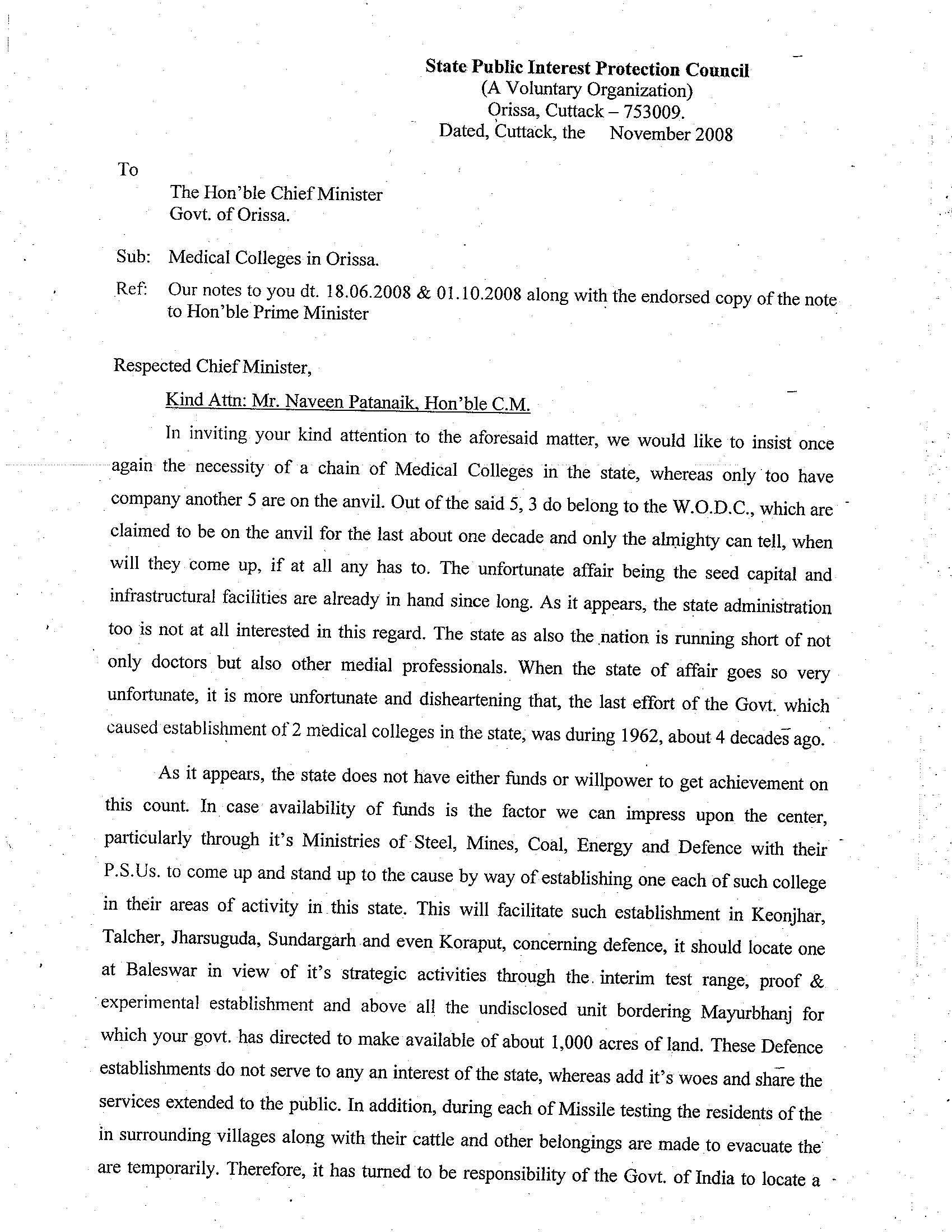
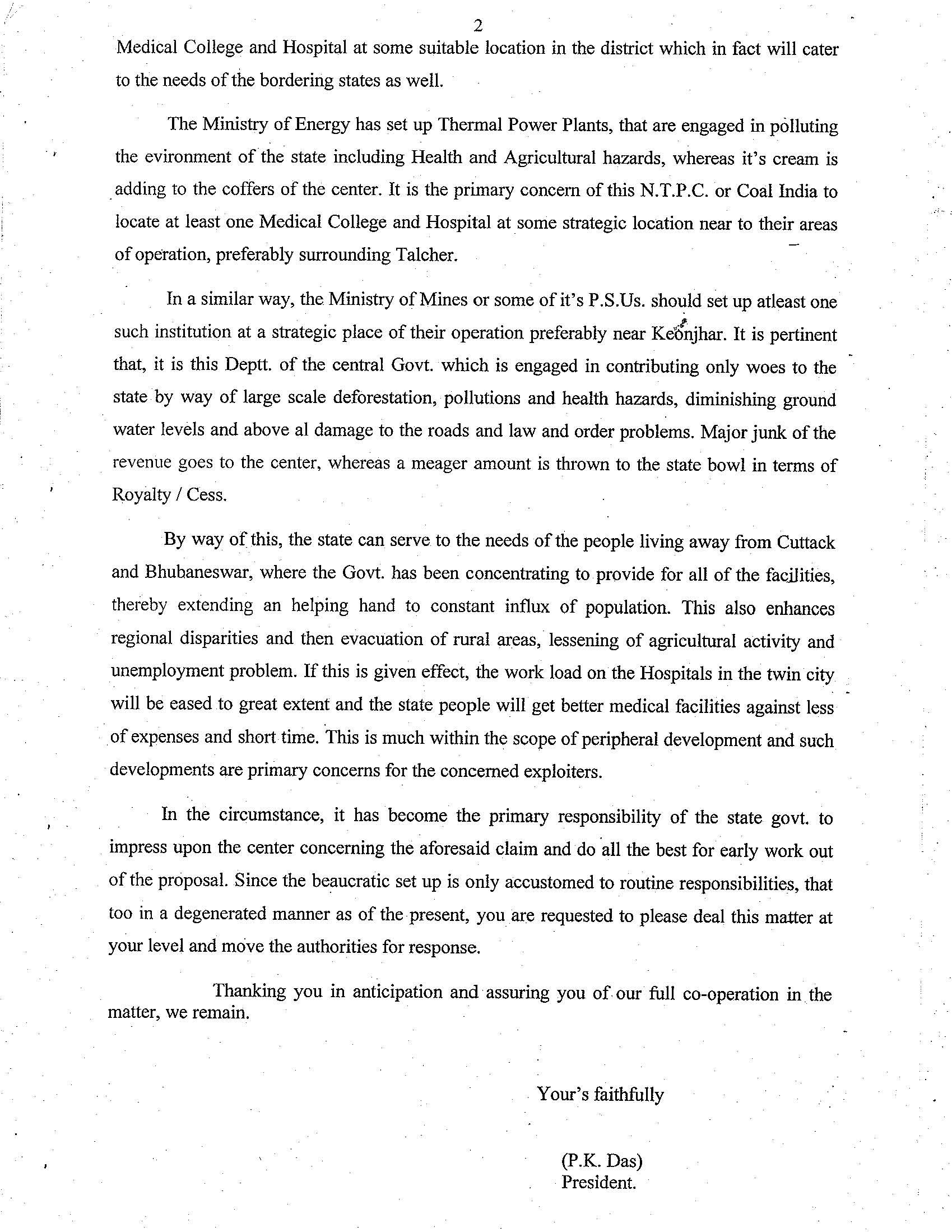
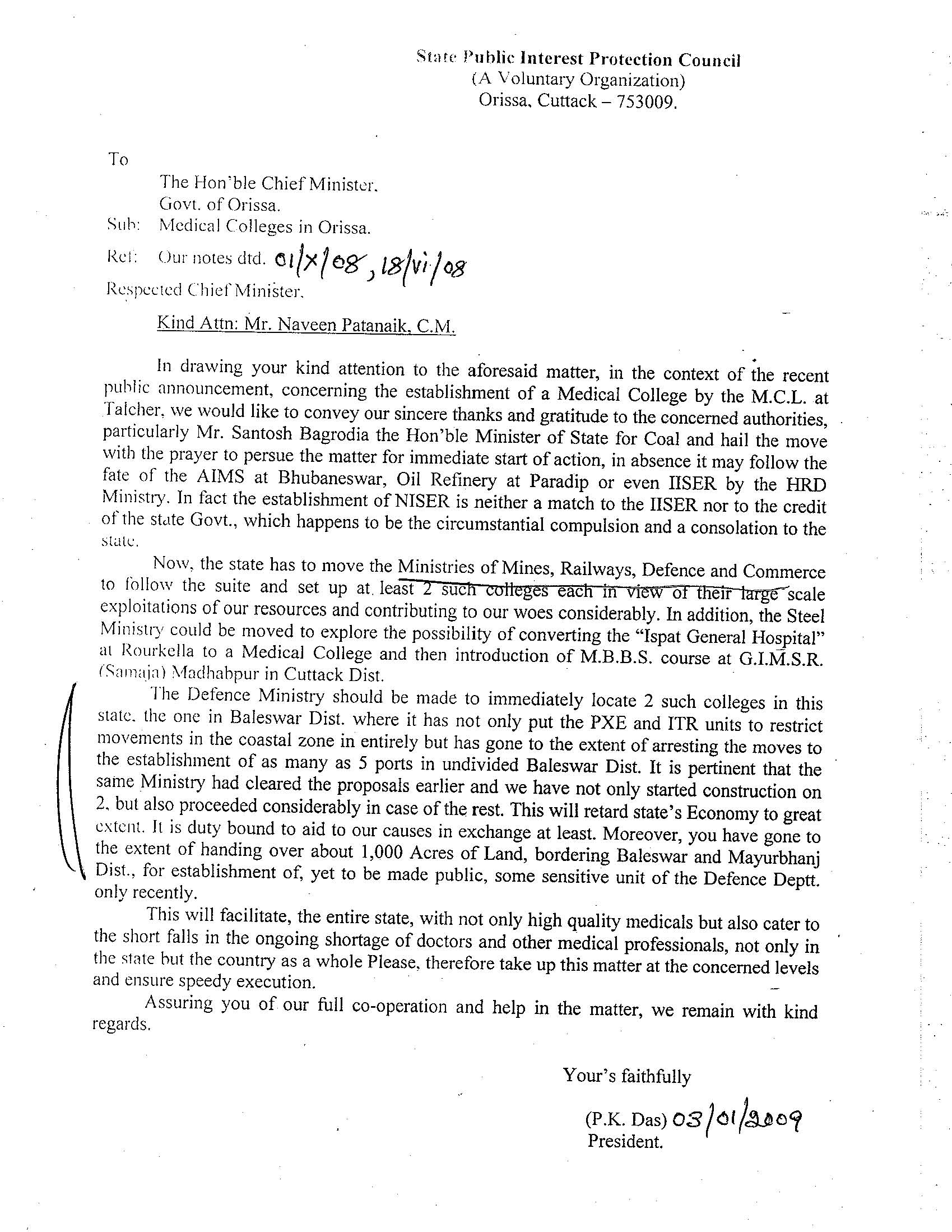
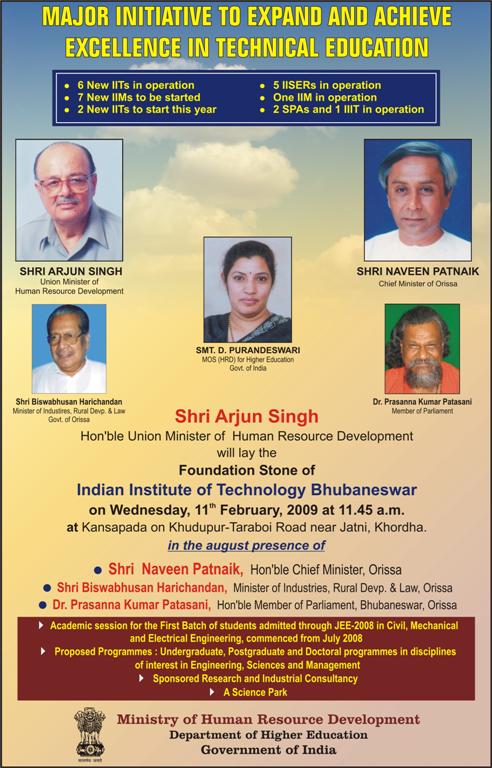
.jpg)
